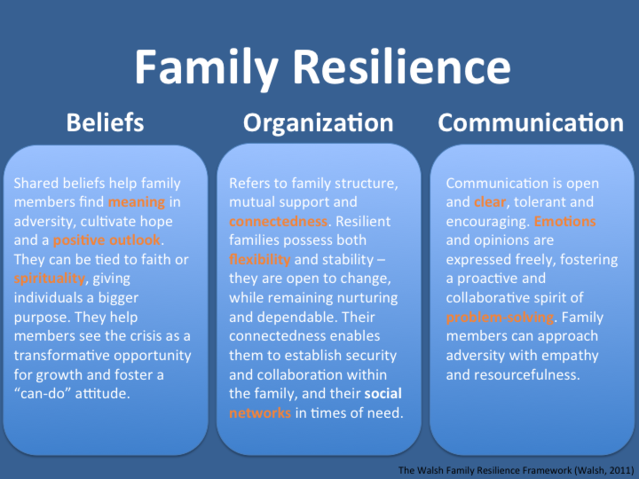Resilience
What Makes Families Resilient?
Nurturing strength amid adversity.
Posted October 11, 2017 Reviewed by Jessica Schrader
Family resilience has been defined as the family’s ability to “withstand and rebound from disruptive life challenges, strengthened and more resourceful” (Walsh, 2011, p 149). From decades of research and clinical experience, Dr. Froma Walsh, one of the leading authorities on family resilience, has identified nine processes around the beliefs, organization, and communication of families that can shape their response to adversity.

Family resilience, as Dr. Walsh points out, is not just about weathering a storm. Rather, it’s about turning adversity into a catalyst for the family’s growth. It’s about enriching relationships and making family members more skilled at coping with future stresses. We all strive for resilience. Who wouldn't want the ability to meet life’s inevitable challenges with grace? But how are resources for resilience built within a unit of unique individuals, circumstances, and dynamics? With the magic of the small, everyday things, it appears. A conversation here, an activity there. Word by word, bond after bond, families fill their wells with strength and wisdom, hope and creativity. And the reassurance of this common well of reserves becomes a big part of their resilience.
Here is Dr. Walsh in her own words.
1) What has surprised you from your research on resilient families?
Earlier, the idea of strong families involved a set of traits: you either had them or you didn't. But families come with various values and structures, and what matters are their interactional processes: how they support each other. In my research, I found that there was resilience not only in the “normal” families but also in the families that had gone through hard times. It was never about the “rugged individual” saying “I just did it on my own” and “I had all the ingredients inside of me.” Rather, resilience was more about relational support from others. Another surprise was how adversity itself can turn into an opportunity to become stronger, together. Resilience is something that can be built at any point in the lifecycle, even in the most vulnerable families. As a clinician, it has helped me to see the possibilities for gaining resilience.
2) Is there something that resilient families seem to share?
Most families put the nine processes of resilience together differently and creatively, like recipes. The beliefs or practices can be either skills or ways of thinking and being together that promote adaptation to the situation and enable families to have hope in really dark times. They can also enable family members to take action when they feel stuck or have a positive outlook. Another one is making meaning of what you are going through in a way that facilitates your adaptation. I like the saying Master the art of the possible: understand that there are certain things you can’t change the situation and focus your energy on the things that you can change. There is also transcendence; the idea that there is a larger purpose. There are the family role models, like a grandmother who kept them strong because they knew that it was possible. And in a lot of cases, there was their spirituality. For example, single mothers would say, “I talk to God. He helps our family to get through.”
3) How important is family resilience for the well-being of family members during challenging times?
A basic premise in family systems is: The whole is greater than the sum of its parts. It isn’t just that you have a strong mother or father who holds everything together. Rather, there has to be a sense of common purpose and mutual interdependency. We are here to support each other and care about each other. When one falls back or needs help, the others will step forward. This way, the resilience of the family unit will trickle down to each individual, because each family member is participating in the resilience. For instance, when a parent starts to over-function and some of the kids end up feeling left behind, research shows that they’ll do much better if they participate. They could draw pictures, sweep up, or help Mom. The key is that everyone plays a part. It’s teamwork. A relational approach of resilience is how can we become strong on our own and build a network around us, that we are not forced to do it on our own.
4) What can families who relocate between cultures learn from your research to better prepare themselves for the stresses of international transitions?
For international adaptation, a lot has to do with openness. It’s easy and comforting to keep to yourself or the ex-pat community. But immersion is important, and so is leaving your comfort zone. Start having conversations with people. Invite them to your home. Share a meal. In other words, go outwards and open your boundaries. It will enrich your experience while enlarging your heart and your mind. But don't cut yourself from your past. If you were to cut off a plant from its roots and transplant it elsewhere, it will not survive. You have to bring some of its roots with it.
5) How does communication nurture the family’s resilience?
Communication helps family members feel more connected. For instance, children can prepare a meal with their parents when someone comes over. Or parents can take their children when they visit new places. Whatever the activity, parents can reflect on it with their children afterward and make meaning of the occasion by talking about it. Ask questions like, “What was that like for you? What surprised you?” Even collecting keepsakes and exchanging gifts can become practices that strengthen the resilience of the whole family. What parents impart onto their children and the way they carry themselves is so important. In a way, they are conveying a set of attitudes and beliefs to their kids. An attitude might be, “Look, isn’t it interesting?” rather than, “Oh my God, what is that?” If we start with the attitude “I am going to make the best of it!” then the kids will pick up on it.
Also, as part of communication, an important aspect in family resilience is to acknowledge the hardships. You have to sit with family members, comfort them, and acknowledge their feelings. It’s equally important to have joy together. It’s not just problem-solving. It is also finding things to celebrate, finding ways to have fun or to laugh at mistakes. In the end, it’s also about the outlook that we hold as individuals and as families. We can look at adversity and see all the ways that it can run us down. Or we can think of it as something that will transform and empower us.
Many thanks to Froma Walsh for being generous with her time and insights. Froma Walsh, MSW, Ph.D., is co-director and co-founder of the Chicago Center for Family Health and is the Mose and Sylvia Firestone Professor Emerita in the School of Social Service Administration and Department of Psychiatry, Pritzker School of Medicine, at the University of Chicago. She is a licensed clinical psychologist and an AAMFT approved supervisor. Dr. Walsh is the author of Strengthening Family Resilience (2015, 3rd edition).
References
Southwick, S. M., Litz, B. T., Charney, D., & Friedman, M. J. (Eds.). (2011). Resilience and mental health: Challenges across the lifespan. Cambridge University Press.
Walsh, F. (2011). Family resilience: a collaborative approach in response to stressful life challenges. Resilience and mental health: Challenges across the lifespan, 149-161.


